Social Links Widget
Click here to edit the Social Media Links settings. This text will not be visible on the front end.
Concessions On The Table
30-Year Mortgage Rates Lowest Since April
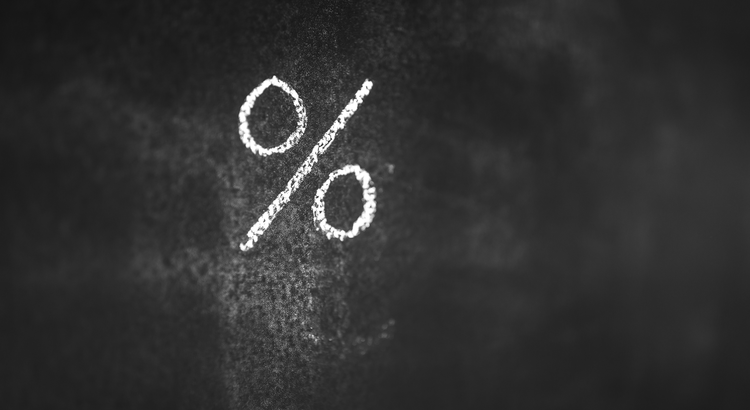
Freddie Mac (OTCQB: FMCC) today released the results of its Primary Mortgage Market Survey® (PMMS®), showing the 30-year fixed-rate mortgage (FRM) averaged 6.63%.
“The 30-year fixed-rate mortgage dropped to its lowest level since April,” said Sam Khater, Freddie Mac’s Chief Economist. “The decline in rates increases prospective homebuyers’ purchasing power and our research shows that buyers can save thousands by getting quotes from a few different lenders.”
- The 30-year FRM averaged 6.63% as of August 7, 2025, down from last week when it averaged 6.72%. A year ago at this time, the 30-year FRM averaged 6.47%.
- The 15-year FRM averaged 5.75%, down from last week when it averaged 5.85%. A year ago at this time, the 15-year FRM averaged 5.63%.
The PMMS® is focused on conventional, conforming, fully amortizing home purchase loans for borrowers who put 20% down and have excellent credit.
Buying New Today

The Truth About Down Payments (It’s Not What You Think)

Buying a home is exciting… until you start thinking about the down payment. That’s when the worry can set in.
“I’ll never save enough.”
“I need a small fortune just to get started.”
“I guess I’ll just rent forever.”
Sound familiar? You’re not alone. And you’re definitely not out of luck.
Here’s the thing: a lot of what you’ve heard about down payments just isn’t true. And once you know the facts, you might realize you’re a lot closer to owning a home than you think.
Let’s break it all down and bust some big down payment myths while we’re at it.
Myth 1: “I need to come up with a big down payment.”
This one stops a lot of people in their tracks. A recent poll from Morning Consult and NeighborWorks shows 70% of Americans think they need to put at least 10% down to buy a home. And 11% aren’t sure what’s required at all (see graph below):
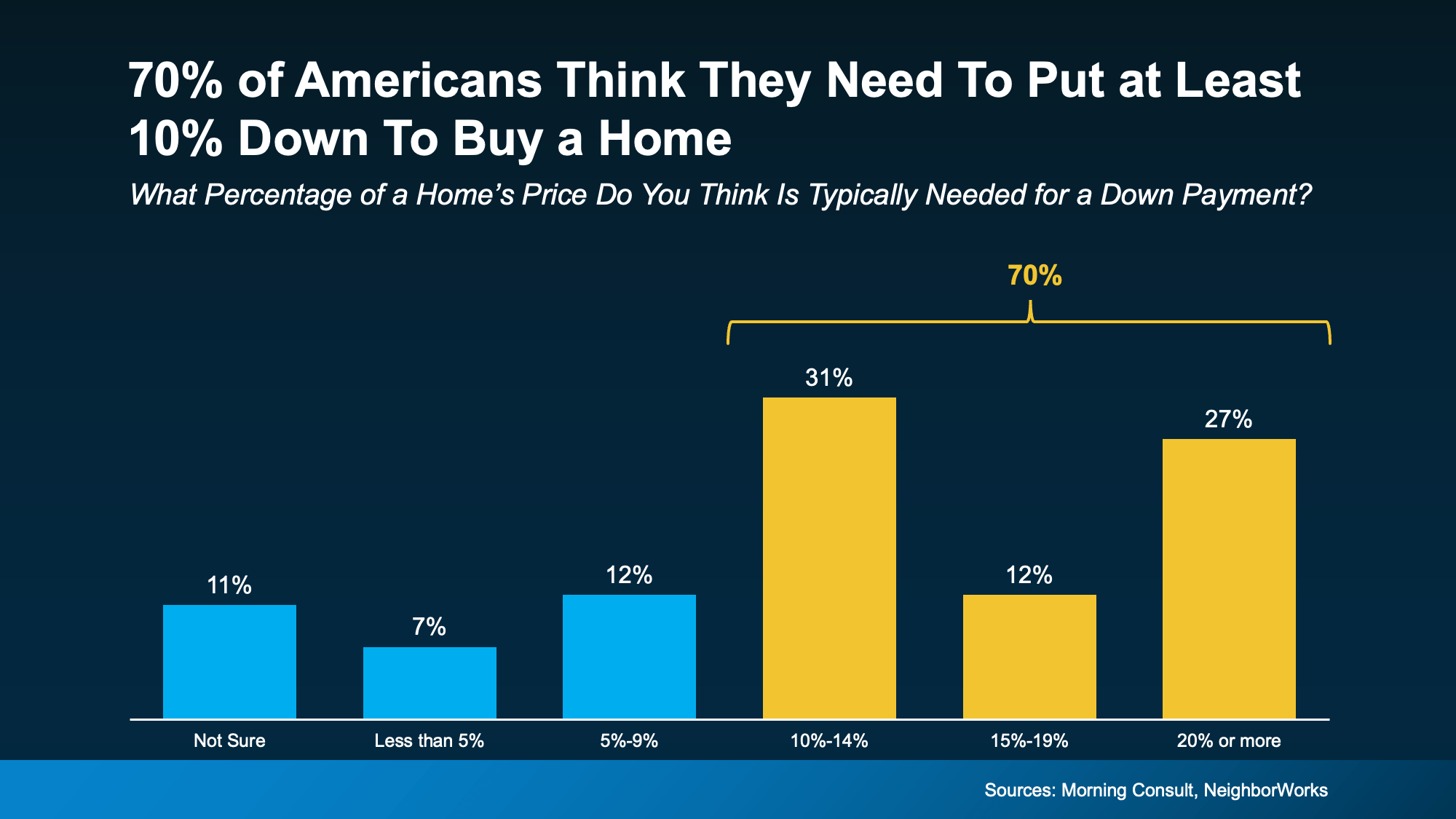 The truth? According to the National Association of Realtors (NAR), the typical down payment for first-time buyers has been between 6% and 9% since 2018. But there’s more to the story. If you qualify for an FHA loan, you may only need to put 3.5% down. And VA loans typically don’t require a down payment at all. So, there are options out there that can really make a difference for some buyers.
The truth? According to the National Association of Realtors (NAR), the typical down payment for first-time buyers has been between 6% and 9% since 2018. But there’s more to the story. If you qualify for an FHA loan, you may only need to put 3.5% down. And VA loans typically don’t require a down payment at all. So, there are options out there that can really make a difference for some buyers.
Myth 2: “It’ll take forever to save up for a down payment.”
Sure, saving can take time. But it may not have to be as long as you think. In many states, reaching your goal can happen faster than you might expect, especially when you know your budget and have a clear savings plan.
According to a new study, the amount of time varies depending on where you live. The map below shows, on average, how many years it takes to save up for a 10% down payment based on typical home values and income levels in each state (see map below):
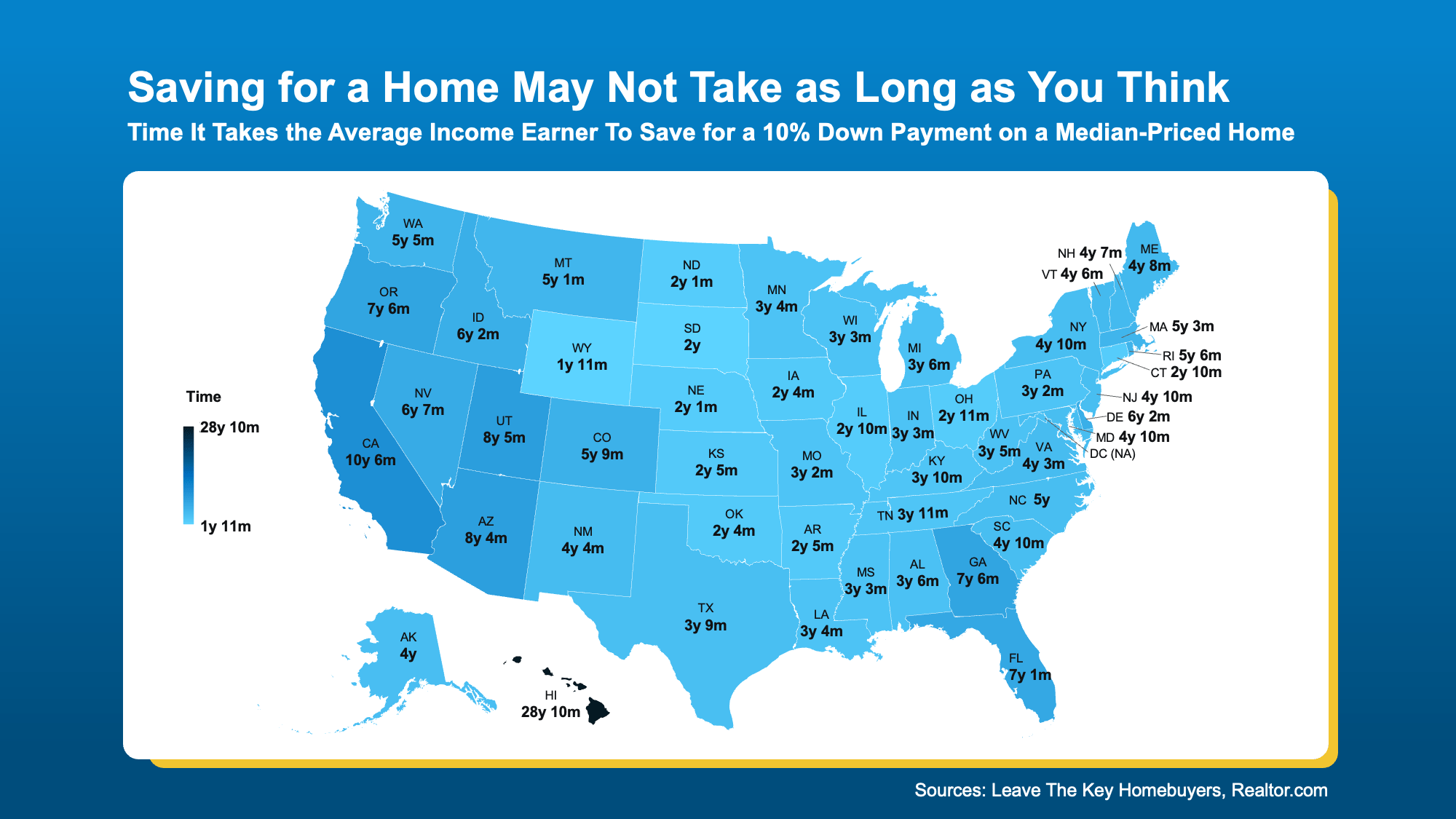 But remember, in most cases you won’t even need a down payment as large as 10%. Plus, no matter how much money you end up putting down, it won’t all have to come out of your pocket. Here’s why.
But remember, in most cases you won’t even need a down payment as large as 10%. Plus, no matter how much money you end up putting down, it won’t all have to come out of your pocket. Here’s why.
Myth 3: “I have to do it all on my own.”
This is one of the biggest myths of all. The reality is, there are thousands of down payment assistance programs out there, and the same poll from Morning Consult and NeighborWorks shows 39% of people don’t even know about them. That means a lot of potential homebuyers could already be closer to homeownership – they just don’t realize it.
These assistance programs are designed to help people like you who are ready to own a home but just need a little support getting started. As Miki Adams, President at CBC Mortgage Agency, explains:
“With high interest rates and soaring home prices, down payment assistance is more essential than ever.”
Bottom Line
If you’ve been putting off buying a home because the down payment feels like too much to tackle, let’s talk. You may not need as much as you think, and there are plenty of resources out there, so you don’t have to do it alone. You just need an expert to point you in the right direction.
If a down payment wasn’t holding you back, would you be ready to start your home search?
The Tale of Two Markets

Depending on where you live, the housing market could feel red-hot or strangely quiet right now. The truth is, local markets are starting to move in different directions. In some places, buyers are calling the shots. In others, sellers still hold the power. It’s a tale of two markets.
What’s a Buyer’s Market vs. a Seller’s Market?
In a buyer’s market, there are more homes for sale and not as many buyers. That means homes sit longer, buyers have more negotiating power, and prices tend to soften as a result. It’s simple supply and demand.
On the flip side, a seller’s market happens when there aren’t enough homes available for the number of people looking to buy them. Because buyers have to compete with each other to get the house they want, that leads to faster sales, multiple offers, and rising prices.
Right now, both of these scenarios are playing out, depending on where you are. So, how do you know what kind of market you’re in? Lean on a local real estate agent. They’ll explain what’s really happening in your area based on these key drivers.
The Number of Buyers and Sellers by Region
One of the biggest factors impacting each market is the number of active buyers and sellers. According to Redfin, here’s what that looks like by region (see graph below):
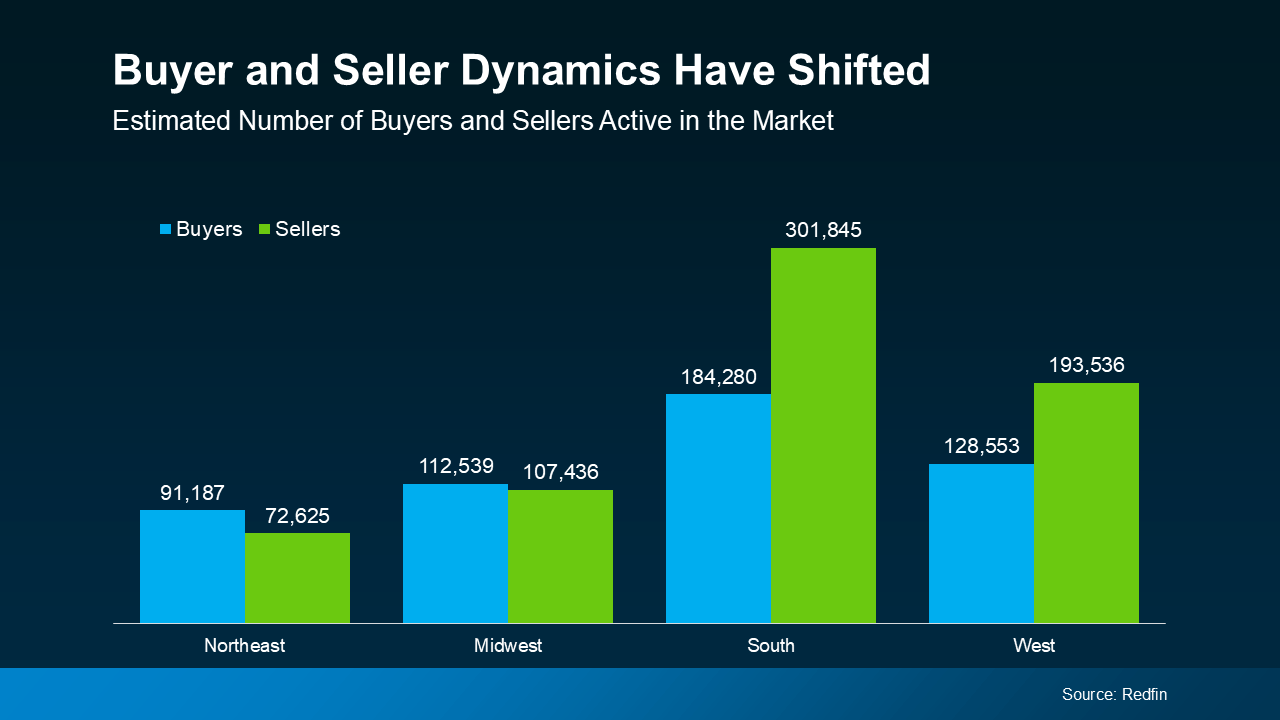 Today, the Northeast and Midwest are more likely to be seller’s markets. Buyers still outnumber sellers there, and that keeps things tilted in favor of homeowners. Generally speaking, homes are selling faster and prices are rising in those areas.
Today, the Northeast and Midwest are more likely to be seller’s markets. Buyers still outnumber sellers there, and that keeps things tilted in favor of homeowners. Generally speaking, homes are selling faster and prices are rising in those areas.
But the South and West are leaning more toward buyer’s markets. There are more sellers than buyers, which means more listings to choose from and less competition among buyers.
That’s a major shift from a few years ago when sellers had the advantage almost everywhere. Today, your local conditions matter more than ever – and they can vary even from one neighborhood to the next.
Price Trends Mirror the Buyer/Seller Divide
When inventory and buyer activity shift, so do prices. In places where demand still outpaces supply, like much of the Northeast and Midwest, prices are continuing to climb.
But in parts of the South and West where inventory is up and demand has cooled, prices are softening. And that’s a plus for buyers looking to negotiate in those areas.
Here’s the latest price data from ResiClub to show how this divide is shaking out across the top metros in the country (see graph below):
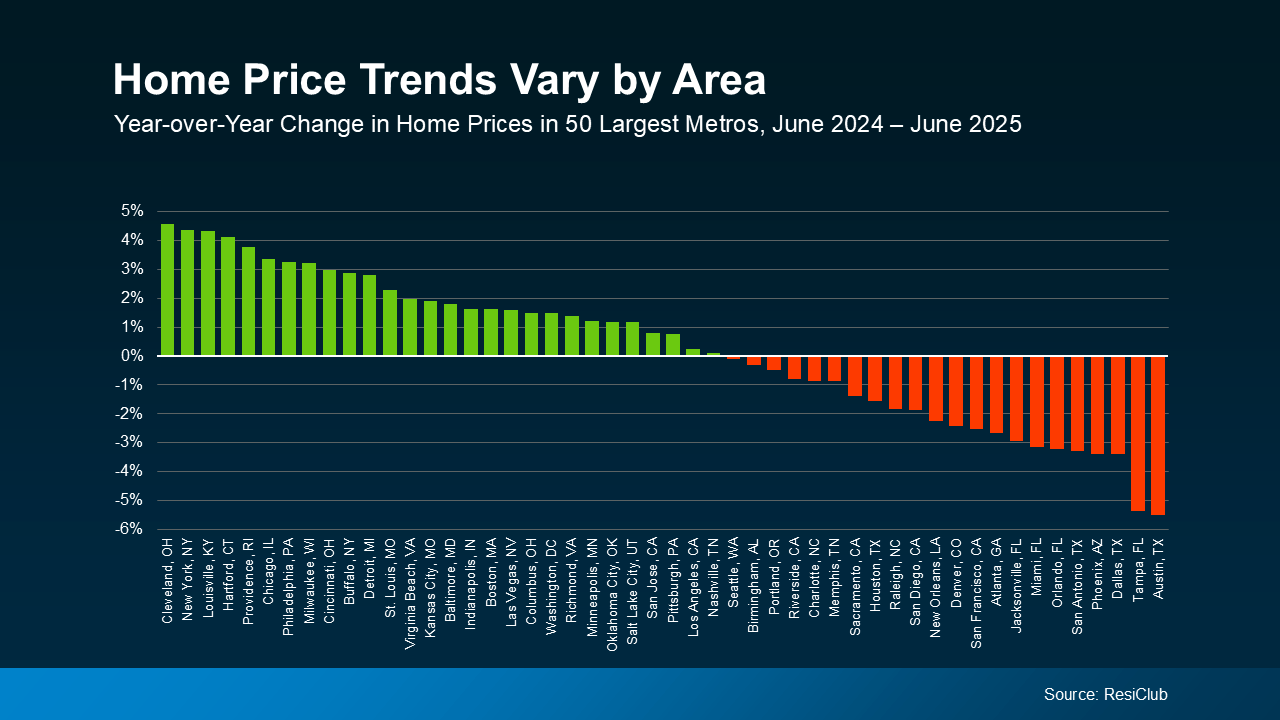 This is why it’s the tale of two markets. Roughly half of the top 50 metros are up, and half are relatively flat or down.
This is why it’s the tale of two markets. Roughly half of the top 50 metros are up, and half are relatively flat or down.
That said, don’t panic if you own a home in a market where prices are dipping. Most homeowners have built up significant equity over the past few years, and chances are you have too. So, you’re likely still come out way ahead when you sell.
Why Local Insights Matter
Even in regions that lean more buyer-friendly right now, there will be cities, towns, and even neighborhoods that don’t follow the regional trends. That’s why an agent’s local market expertise is so important. They can help you understand what’s happening all the way down to a zip code level, including:
- Whether your area is favoring buyers or sellers
- How to set the right price or craft an offer strategy based on local trends
- The best way to make your move happen, no matter what’s happening in the market
Bottom Line
In a market where conditions vary this much from place to place, success starts with understanding every aspect of your local area. Let’s connect so you’ve got an expert in your corner who knows exactly how to guide you through your market, wherever you are.
The Latest Mortgage Rate Forecasts

If you’re tempted to wait for rates to come down before you buy a home, here’s what you should know. Based on expert forecasts, mortgage rates are expected to stay in the 6s this year. Let’s talk about what this means for your move and how to factor this into your plans.
Do You Have To Put Down 20 Percent?

Could Renting Be Holding You Back?

Renting might feel like the safer bet right now, but it could be holding you back.
Five-Year Rule for Home Price Perspective

Headlines are saying home prices are starting to dip in some markets. And if you’re beginning to second guess your plans based on what you’re hearing in the media, here’s what you need to know.
It’s true that a few metros are seeing slight price drops. But don’t let that overshadow this simple truth. Home values almost always go up over time (see graph below):
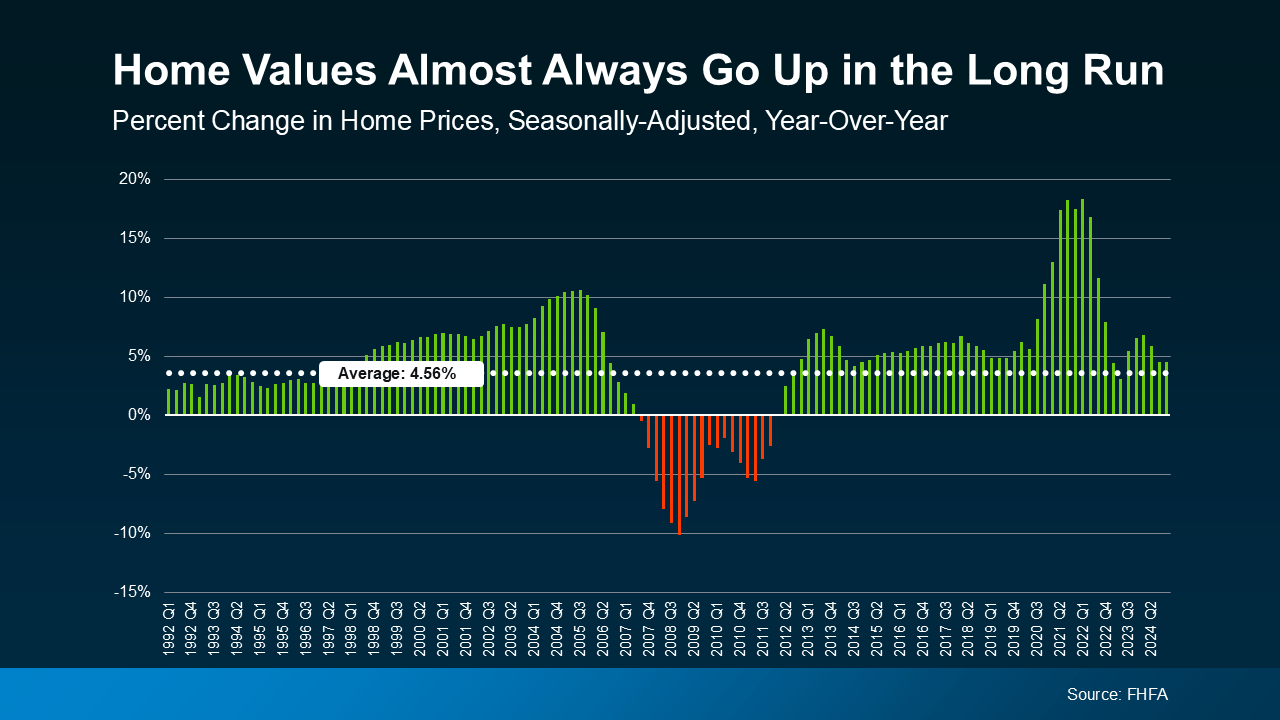 While everyone remembers what happened around the housing crash of 2008, that was the exception – not the rule. It hadn’t happened before, and hasn’t since. There were many market dynamics that were drastically different back then, too. From relaxed lending standards to a lack of homeowner equity, and even a large oversupply of homes, it was very different from where the national housing market is today. So, every headline about prices slowing down, normalizing, or even dipping doesn’t need to trigger fear that another big crash is coming.
While everyone remembers what happened around the housing crash of 2008, that was the exception – not the rule. It hadn’t happened before, and hasn’t since. There were many market dynamics that were drastically different back then, too. From relaxed lending standards to a lack of homeowner equity, and even a large oversupply of homes, it was very different from where the national housing market is today. So, every headline about prices slowing down, normalizing, or even dipping doesn’t need to trigger fear that another big crash is coming.
Here’s something that explains why short-term dips usually aren’t a long-term deal-breaker.
What’s the Five-Year Rule?
In real estate, you might hear talk about the five-year rule. The idea is that if you plan to own your home for at least five years, short-term dips in prices usually don’t hurt you much. That’s because home values almost always go up in the long run. Even if prices drop a bit for a year or two, they tend to bounce back (and then some) over time.
Take it from Lance Lambert, Co-Founder of ResiClub:
“. . . there’s the ‘five-year rule of thumb’ in real estate—which suggests that most buyers can buffer themselves from mild short-term declines if they plan to own a property for at least that amount of time.”
What’s Happening in Today’s Market?
Here’s something else to put your mind at ease. Right now, most housing markets are still seeing home prices rise – just not as fast as they were a few years ago.
But in the major metros where prices are starting to cool off a little (the red bars in the graph below), the average drop is only about -2.9% since April 2024. That’s not a major decline like we saw back in 2008.
And when you look at the graph below, it’s clear that prices in most of those markets are up significantly compared to where they were five years ago (the blue bars). So, those homeowners are still ahead if they’ve been in their house for a few years or more (see graph below):
 The Big Picture
The Big Picture
Over the past 5 years, home prices have risen a staggering 55%, according to the Federal Housing Finance Agency (FHFA). So, a small short-term dip isn’t a significant loss. Even if your city is one where they’re down 2% or so, you’re still up far more than that.
And if you break those 5-year gains down even further, using data from the FHFA, you’ll see home values are up in every single state over the last five years (see map below):
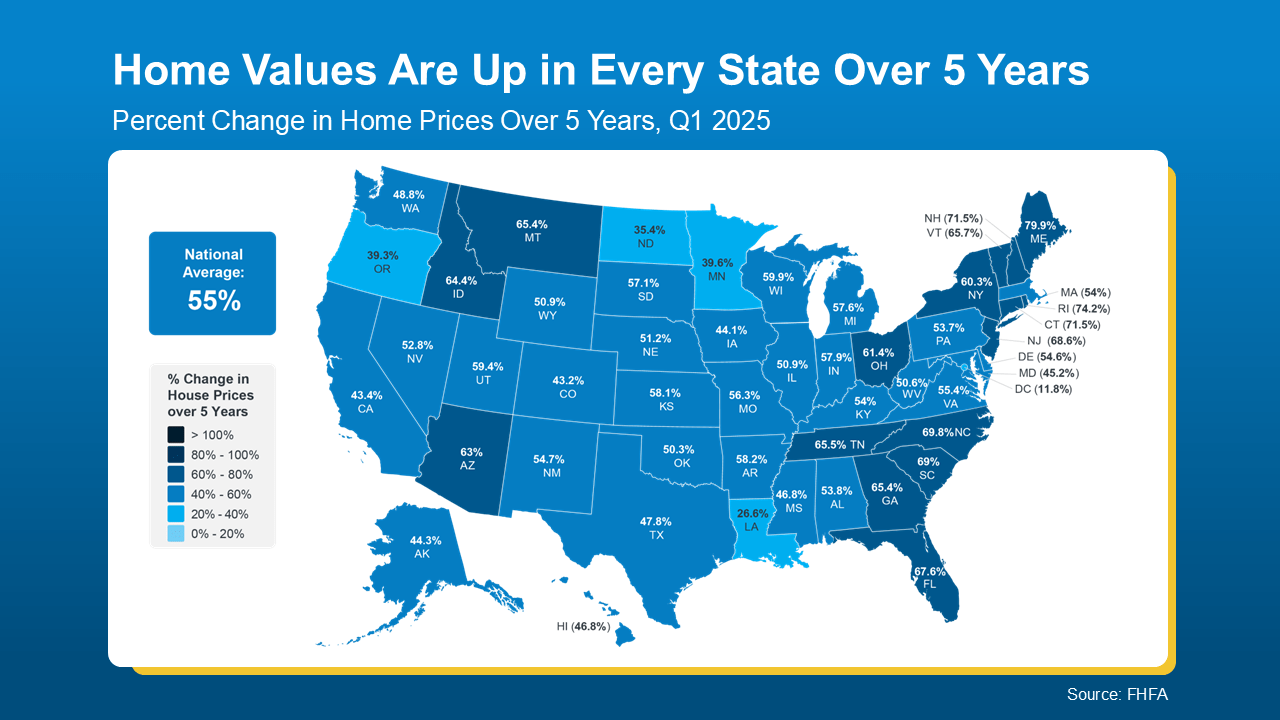 That’s why it’s important not to stress too much about what’s happening this month, or even this year. If you’re in it for the long haul (and most homeowners are) your home is likely to grow in value over time.
That’s why it’s important not to stress too much about what’s happening this month, or even this year. If you’re in it for the long haul (and most homeowners are) your home is likely to grow in value over time.
Bottom Line
Yes, prices can shift in the short term. But history shows that home values almost always go up – especially if you live there for at least five years. So, whether you’re thinking of buying or selling, remember the five-year rule, and take comfort in the long view.
When you think about where you want to be in five years, how does owning a home fit into that picture?
Let’s connect to get you there.
Home Projects That Add Value
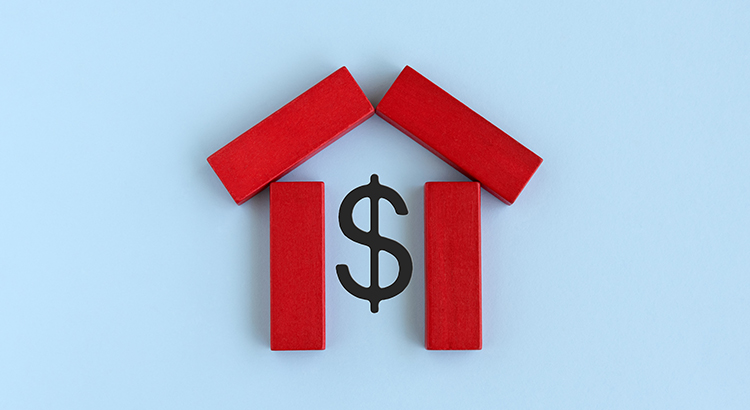
Are you thinking about tackling a few home projects?
Whether you’re planning to sell soon or not, you should know not every upgrade is going to add value.
Here’s some national data on projects where you’re most likely to recoup your costs. Just remember, your area may look a little different based on which features are in demand here.
So, before you dive in, let’s talk about what’s actually worth it in your market. Because the ones that have the best return on your upfront investment may surprise you.


 Facebook
Facebook
 X
X
 Pinterest
Pinterest
 Copy Link
Copy Link
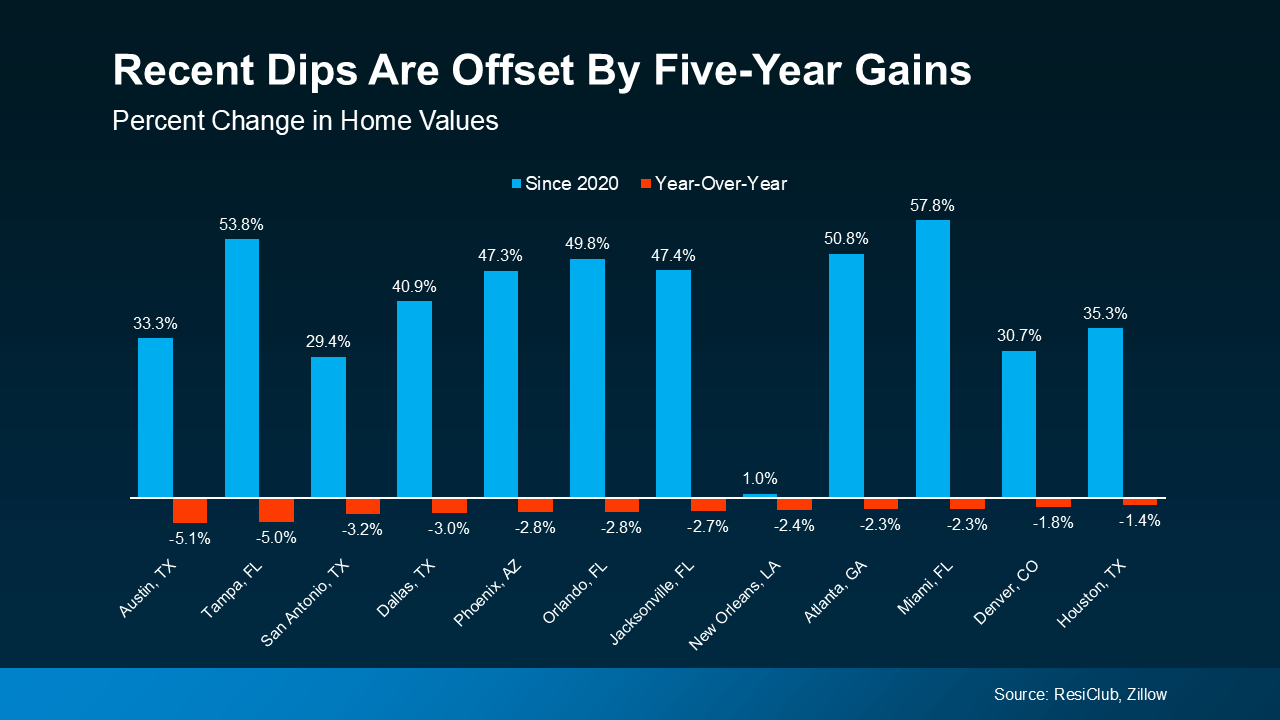 The Big Picture
The Big Picture
